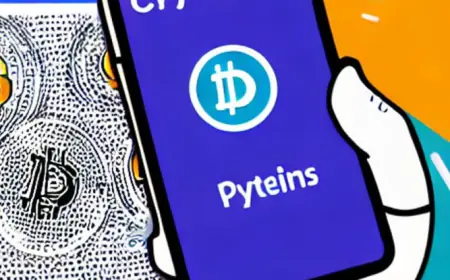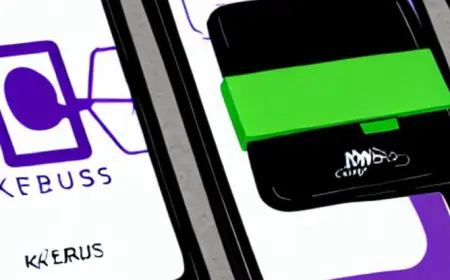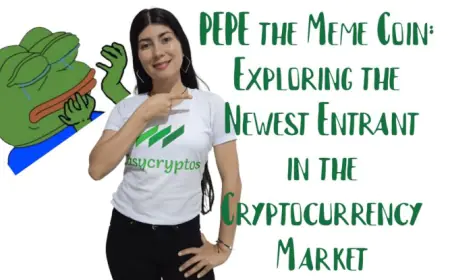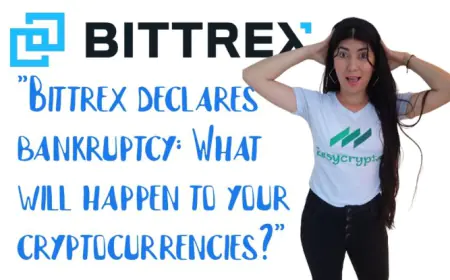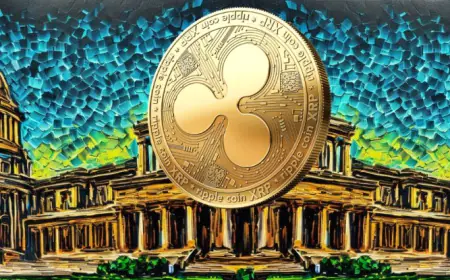Tokenization: The Key to Biden's Electric Vehicle Revolution
Explore the transformative potential of tokenization in driving forward President Biden's ambitious electric vehicle (EV) revolution. Discover how tokenization can unlock new opportunities for financing, incentivizing, and scaling the adoption of EVs. Gain insights into the benefits, challenges, and future prospects of tokenization in revolutionizing the transportation sector and advancing sustainable mobility.

The world is at a critical juncture when it comes to addressing climate change and transitioning to cleaner energy sources. In the United States, President Joe Biden has set forth an ambitious plan to revolutionize the transportation sector by promoting the widespread adoption of electric vehicles (EVs). As part of this vision, an emerging technology known as tokenization holds immense promise in driving forward the electric vehicle revolution. By harnessing the power of tokenization, we can unlock new avenues for financing, incentivizing, and scaling the adoption of EVs. In this article, we will delve into the concept of tokenization and explore how it can play a pivotal role in realizing President Biden's vision of a sustainable and electrified future for transportation. We will examine the benefits, challenges, and future prospects of tokenization in revolutionizing the transportation sector and paving the way for a cleaner, greener, and more efficient future.
Understanding Tokenization in the Context of Electric Vehicles
In recent years, tokenization has emerged as a groundbreaking technology with the potential to revolutionize various industries, including finance, real estate, and now, transportation. At its core, tokenization involves the conversion of real-world assets or rights into digital tokens on a blockchain. These tokens represent ownership, value, or utility and can be traded or exchanged with ease, securely and transparently.
When applied to the electric vehicle sector, tokenization brings about a host of transformative possibilities. It enables the representation and transfer of ownership rights, usage rights, and even carbon credits associated with electric vehicles. By digitizing and tokenizing these assets, the barriers to entry and transactional friction can be significantly reduced.
Financing Electric Vehicle Infrastructure and Adoption
One of the key challenges in accelerating the widespread adoption of electric vehicles is the need for extensive infrastructure, including charging stations, battery swapping facilities, and smart grid solutions. Traditional financing models often face hurdles due to the high upfront costs and uncertainties surrounding the emerging electric vehicle market.
Tokenization offers an innovative solution by enabling fractional ownership and investment opportunities in electric vehicle infrastructure. Through tokenized investment offerings, individuals can invest in specific charging stations, EV charging networks, or other related projects, allowing them to become stakeholders in the growth of the electric vehicle ecosystem. This opens up new avenues for funding, democratizing access to investment opportunities and potentially attracting a broader base of investors.
Incentivizing Electric Vehicle Adoption and Behavior
Incentivizing the transition to electric vehicles is crucial for achieving widespread adoption and reducing carbon emissions. Tokenization can play a vital role in this process by introducing reward systems that incentivize individuals for choosing electric vehicles and adopting sustainable driving behaviors.
By tokenizing incentives, such as carbon credits or loyalty rewards, users can be rewarded for choosing electric vehicles over traditional combustion engine vehicles. These tokens can be earned through various means, such as participating in energy-saving programs, using charging infrastructure, or achieving specific environmental targets. These incentives not only encourage the adoption of electric vehicles but also foster sustainable driving practices and contribute to a greener future.
Enhancing Supply Chain Transparency and Efficiency
Another area where tokenization can have a transformative impact is in enhancing supply chain transparency and efficiency for electric vehicle components and raw materials. Electric vehicle manufacturers can tokenize the traceability and certification of key components, ensuring transparency and authenticity throughout the supply chain.
Through tokenization, consumers and stakeholders can track the origin, manufacturing process, and environmental footprint of critical components like batteries or rare earth minerals used in EV production. This level of transparency instills confidence in consumers, ensures ethical sourcing practices, and supports the transition to sustainable supply chains.
In the next sections of this article, we will explore further applications and benefits of tokenization in the electric vehicle sector, along with the challenges and considerations that need to be addressed for its successful implementation. The potential of tokenization in driving President Biden's electric vehicle revolution is vast, and understanding its various facets is essential for realizing a sustainable and electrified future for transportation.
Overcoming Challenges and Embracing Opportunities in Tokenization for Electric Vehicles
While the potential benefits of tokenization in the electric vehicle sector are promising, there are challenges and considerations that must be addressed to fully harness its transformative power.
Regulatory and Legal Frameworks
One of the primary challenges surrounding tokenization is the establishment of robust regulatory and legal frameworks. As tokenization involves the representation of real-world assets or rights, it requires legal clarity to ensure compliance with existing regulations. Governments and regulatory bodies need to provide guidance and clarity on how tokenized assets and transactions should be treated, addressing concerns such as investor protection, anti-money laundering (AML), and know-your-customer (KYC) regulations.
Establishing a comprehensive regulatory framework will not only instill confidence in investors and participants but also provide a solid foundation for the growth of tokenization in the electric vehicle sector.
Interoperability and Standardization
For tokenization to reach its full potential in the electric vehicle sector, interoperability and standardization across different blockchain platforms and protocols are vital. Currently, there are various blockchain networks, each with its own token standards and protocols. Achieving interoperability would enable seamless transferability and compatibility of tokens across different platforms, enhancing liquidity and facilitating widespread adoption.
Standardization efforts, such as the development of common token standards and protocols, are essential for creating a unified ecosystem where tokens can freely interact and transact with one another. Collaboration among industry players, blockchain developers, and standardization bodies can drive the adoption of interoperable tokenization solutions.
Data Privacy and Security
Tokenization involves the digitization of assets and transactions, which raises concerns about data privacy and security. As electric vehicles generate vast amounts of data, including location information, usage patterns, and personal preferences, protecting user privacy becomes paramount. It is essential to develop robust data privacy frameworks that safeguard sensitive information while still allowing for efficient and secure tokenized transactions.
Implementing strong encryption, secure authentication mechanisms, and privacy-preserving technologies can help address these concerns, ensuring that tokenized electric vehicle data remains confidential and protected from unauthorized access.
Education and Awareness
Tokenization is a relatively new concept, and widespread adoption will require education and awareness initiatives. Stakeholders, including consumers, investors, policymakers, and industry players, need to be educated about the benefits, risks, and potential applications of tokenization in the electric vehicle sector. Increasing awareness and understanding will foster confidence, drive participation, and spur innovation in this emerging field.
Industry collaborations, educational campaigns, and knowledge-sharing platforms can play a crucial role in promoting awareness and facilitating the exchange of ideas and best practices related to tokenization for electric vehicles.
In the next sections, we will explore further opportunities and future prospects of tokenization in the electric vehicle sector, including its potential impact on renewable energy integration, mobility-as-a-service models, and smart grid integration. Overcoming the challenges and embracing the opportunities presented by tokenization will be instrumental in achieving President Biden's vision of an electric vehicle revolution that transforms our transportation landscape.
Future Prospects and Impact of Tokenization on Electric Vehicles
Tokenization holds immense potential to reshape the electric vehicle sector and accelerate the transition to sustainable transportation. In this section, we will explore the future prospects and potential impact of tokenization in several key areas.
Renewable Energy Integration
Tokenization can facilitate the integration of renewable energy sources with electric vehicle charging infrastructure. By tokenizing renewable energy generation, individuals and businesses can invest in solar panels, wind farms, or other clean energy projects. The generated energy can then be tokenized and directly allocated to power electric vehicle charging stations. This decentralized approach not only supports the growth of renewable energy but also ensures a greener and more sustainable charging infrastructure.
Moreover, tokenization can enable peer-to-peer energy trading, where surplus energy produced by individuals or businesses can be tokenized and sold to others, including electric vehicle owners. This creates a transparent and efficient marketplace for renewable energy, encouraging the adoption of electric vehicles powered by clean energy sources.
Mobility-as-a-Service (MaaS) Models
Tokenization can also play a role in advancing Mobility-as-a-Service (MaaS) models, where users have access to a variety of transportation options through a single platform. By tokenizing transportation services, such as electric vehicle rentals, ridesharing, or bike-sharing, individuals can seamlessly access and pay for these services using digital tokens. Tokenization simplifies transactions, enables interoperability between different service providers, and enhances the overall user experience.
Additionally, tokenization can introduce loyalty programs and rewards within MaaS models, incentivizing users to choose sustainable transportation options like electric vehicles. These rewards can be earned and redeemed across different service providers, creating a cohesive ecosystem that encourages the adoption of electric vehicles and other sustainable modes of transportation.
Smart Grid Integration
The integration of electric vehicles with the existing power grid is a crucial consideration for scaling their adoption. Tokenization can facilitate the development of a smart grid infrastructure that optimizes the charging and discharging of electric vehicle batteries. By tokenizing energy storage and distribution, electric vehicle owners can participate in demand response programs, allowing their vehicle batteries to act as decentralized energy storage units. This enables the grid to balance energy supply and demand more efficiently, reduce peak load, and enhance grid stability.
Furthermore, tokenization can incentivize electric vehicle owners to participate in vehicle-to-grid (V2G) programs, where excess energy stored in their vehicle batteries can be tokenized and sold back to the grid during periods of high demand. This not only provides additional revenue streams for electric vehicle owners but also supports the overall stability and resilience of the electricity grid.
As tokenization continues to evolve and mature, its impact on the electric vehicle sector is likely to expand, opening up new avenues for innovation, collaboration, and sustainable transportation solutions.
The Role of Government Support in Tokenization for Electric Vehicles
Government support and initiatives play a crucial role in shaping the landscape for tokenization in the electric vehicle sector. Recognizing the potential of tokenization to drive the transition to sustainable transportation, governments can take proactive steps to foster its adoption and create an enabling environment for innovation. Here are some key areas where government support can make a difference:
Regulatory Sandboxes and Pilots
Governments can establish regulatory sandboxes or pilot programs to test and evaluate tokenization initiatives in the electric vehicle sector. These sandboxes provide a controlled environment where startups, entrepreneurs, and industry players can experiment with tokenization solutions without facing undue regulatory burdens. This allows for the identification of potential challenges and the development of appropriate regulatory frameworks to support tokenization while ensuring consumer protection and market integrity.
Investment Incentives
To encourage investment in tokenization projects and the development of electric vehicle infrastructure, governments can provide investment incentives such as tax credits, grants, or subsidies. These incentives can attract private capital, stimulate innovation, and drive the growth of tokenization solutions. By creating a favorable investment climate, governments can catalyze the transformation of the electric vehicle sector and accelerate the adoption of tokenization.
Standardization and Interoperability Efforts
Governments can actively participate in and support standardization and interoperability efforts in the field of tokenization for electric vehicles. Collaborating with industry stakeholders, policymakers can help establish common token standards, protocols, and interoperability frameworks. By promoting harmonization and compatibility among different blockchain platforms, governments can unlock the full potential of tokenization and ensure a seamless experience for users and investors.
Public-Private Partnerships
Collaboration between governments, private entities, and academic institutions can drive the research, development, and implementation of tokenization solutions in the electric vehicle sector. Public-private partnerships can leverage the expertise, resources, and networks of both sectors to tackle challenges, share knowledge, and foster innovation. Through these partnerships, governments can harness the collective intelligence and capabilities of various stakeholders to accelerate the adoption of tokenization and advance sustainable mobility goals.
By actively supporting and facilitating the adoption of tokenization in the electric vehicle sector, governments can contribute to the realization of President Biden's vision for a clean energy future. Their involvement can create a conducive ecosystem that promotes investment, innovation, and collaboration, leading to a sustainable and efficient transportation system powered by electric vehicles.
What's Your Reaction?
 Like
1
Like
1
 Dislike
0
Dislike
0
 Love
0
Love
0
 Funny
0
Funny
0
 Angry
0
Angry
0
 Sad
0
Sad
0
 Wow
0
Wow
0









